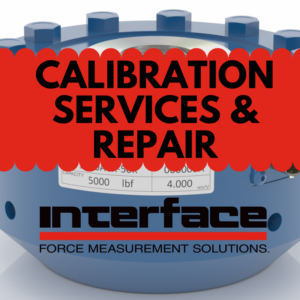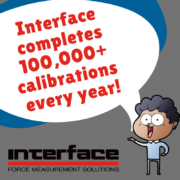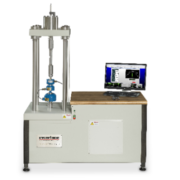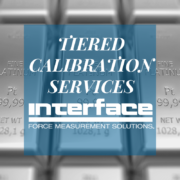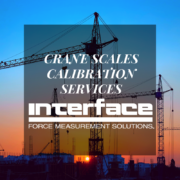Regular Calibration Service Maintains Load Cell Accuracy
Even under ideal conditions with normal use, some new load cells can exhibit a slight improvement in accuracy over a period of time. In contrast, load cells are subject to performance degradation due mistreatment, drift, or aging. Throughout the life of a load cell, Interface recommends that regularly scheduled calibration and inspection to monitor performance and minimize uncertainty.
Calibration is a set of operations that compares the accuracy of a measuring instrument of any type, such as a load cell or torque transducer, against a recognized standard. It is often referenced as load cell characterization.
Calibration service ensures the transducer is performing to listed specification. It helps to avoid costly impacts resulting from invalid data or a load cell shutting down a test in progress. Confidence in data is critical in test and measurement. The calibration assures that measurements gathered within the valid calibration period are reliable, trustworthy, and defensible. To maintain any sensor and minimize cost of poor quality, it is best practice that calibrations are scheduled annually to confirm accuracy to specifications.
There are times when loading conditions and use case environments necessitate the need for more frequent evaluation and calibration cycles. The process of calibration can include adjusting the measuring instrument to bring it in alignment with the standard.
Use Cases for Frequent Calibration Services
- Harsh environmental conditions can cause corrosion and electrical failures
- Loading forces that exceed the load cell rated capacity can cause shifting of the zero-load output of the load cell
- Moment loading of the load cell can cause zero shifts and other undesirable behavior
- High cycle rates or fatigue applications can cause premature failure
Many of these symptoms can be repaired or mitigated if they are identified early during appropriate evaluation and calibration cycles.
Interface standards for calibration are world-class. Our calibration labs are managed by experts in diagnostics, testing and repair with engineering and metrology grade equipment designed by the leaders in force measurement. Interface’s range of calibration service capabilities:
FORCE
- NMI Traceable Calibration
- 50g – 1 Million lbf Capacities
- 11 Hydraulic and 6 Dead Weight Test Stands to Support Calibration Demand
TORQUE
- .022 – 100K in lbf Capacities
- NIST Traceable to 2.2K in lbf
- NMI Traceable 2.2K – 100K in lbf
Why Interface Calibration Services?
- ISO 17025 Accredited
- 50+ Years of Calibration Experience
- 100,000+ Calibrations Performed Annually
- Permanently Archived Test Data
- Highly Trained Professional Technicians
- Quick and Timely Response
- Calibrations Running 24/6
Our guidance is to schedule regular maintenance with an annual check-up. Interface offers world-class diagnostic, repair, and calibration services. You can schedule your calibration service online here.
